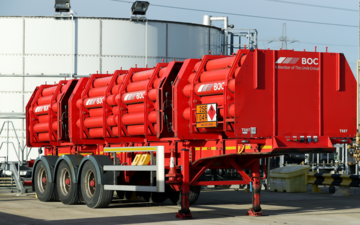BOC is a Linde company, Linde’s decades of expertise in hydrogen is helping to fuel ambitious projects around the world, many of them aimed at decarbonising transport.
Worldwide, Linde has built more than 200 hydrogen refuelling stations for buses, HGVs, service vehicles and cars. The company also operates the world's first high-purity hydrogen storage cavern, on top of pipeline networks totalling approximately 1,000 kilometres globally.
In Germany, Linde recently launched the world’s first hydrogen refuelling system for
hydrogen powered passenger trains, with a total capacity of around 1,600 kg of hydrogen per day, it is one of the largest hydrogen refuelling systems ever built. Linde will supply liquid hydrogen and related infrastructure to the world's first operational
hydrogen-powered ferry, in Norway, which will transport both cars and passengers.


